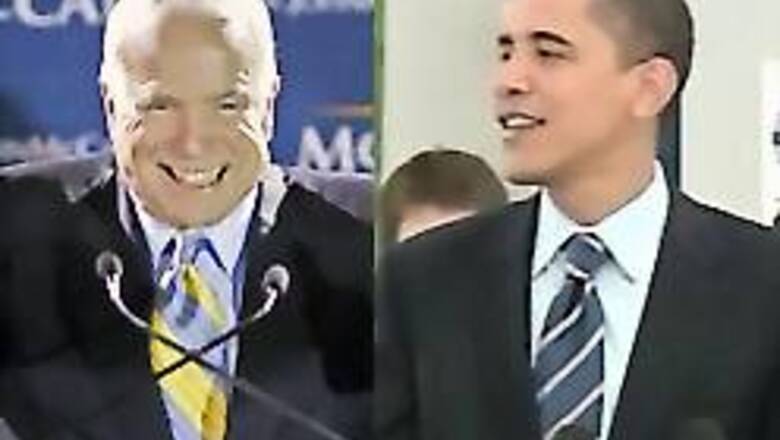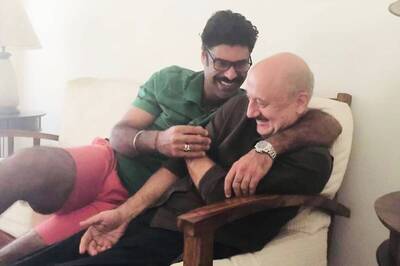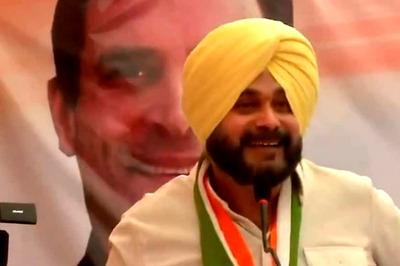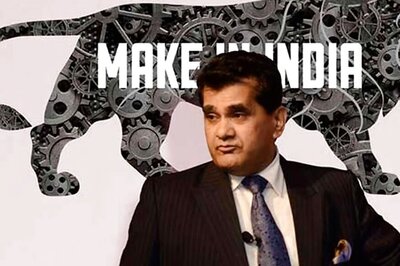
views
Washington: As the candidates try to win over undecided voters, both Republicans and Democrats are pushing a message of change. Sen. John McCain and Alaska Gov. Sarah Palin call themselves the "original mavericks" in a new TV ad.
Sen. John McCain and Alaska Gov. Sarah Palin call themselves the "original mavericks" in a new TV ad. CNN's latest "poll of polls" shows Sen. John McCain leading Sen. Barack Obama 47 percent to 46 percent.
Monday's poll of polls shows that 7 percent of voters are undecided -- enough to push either candidate over the top.
With the election less than two months away, the candidates have limited time to sway undecided voters who hold the election in their hands.
According to John Avlon, author of "Independent Nation: How Centrists Can Change American Politics," independent and swing voters are looking for a break from the Bush administration.
"What they're looking for in this campaign is a candidate who's going to end the hyper-partisanship in Washington and who's going to have credibility on reducing spending, but also sort of the antidote to the Bush administration," he said on CNN's American Morning. "They've been -- instead of fiscally conservative -- fiscally liberal and socially conservative, and that's the opposite of what independents and swing voters want."
Change essentially means new people and new policies, said Bill Schneider, CNN's senior political analyst.
"It's exactly the theme that people want for this year after eight years of the Bush administration," he said. "But the big puzzle in this election is -- what's the best way to get that?"
While Obama seemed to embody the face of change, McCain shook things up by putting Alaska Gov. Sarah Palin on the Republican ticket, Schneider said.
"Barack Obama certainly is a new face in politics. He's only been around a couple of years. He's only been in Washington for a couple of years. So people instantly saw him as a new face, and he was a sensation," Schneider said.
"Now, John McCain put a very new face on his ticket, Sarah Palin. She's a Republican, but she hasn't been around Washington very much. That's his way of dramatizing -- you elect McCain, you're going to see some very new faces, and he adds, some new policies in Washington."
McCain and Palin tout themselves as the "original mavericks" in a television ad released Monday. The 30-second spot says McCain and Palin will "make history" and "change Washington."
The Obama campaign was quick to blast the ad as a "lie."
"McCain and Palin will say or do anything to make people believe that they will change something besides the person sitting in the Oval Office," said spokesman Bill Burton.
Obama this weekend told supporters that he and his running mate, Sen. Joe Biden, are the true agents of change and that Republicans are just copying their message.
"Everywhere I go, we've been talking about change. That's been the theme of this campaign," Obama said. "And we must be on to something, because I notice now everyone's talking about change now."
Democrats have been trying to paint the Republicans as "more of the same," but Schneider said no one really represents the status quo.
"People want change. Both parties recognize that, and both parties are competing with each other to offer it," he said.
Avlon said it's a competition with a lot at stake because "it's the swing voters who decide who's going to carry the balance of power, who will ultimately win that election state by state and even nationwide."
Independent voters tend to be fiscally conservative and socially liberal, and they usually vote for the more centrist candidates, he said. They play such a key role because the votes of the left and right of the parties are predictable. Independents and undecided could go either way.
During his 2000 presidential run, McCain had strong backing from independent voters.
"John McCain does have deep credibility with independents built over the last 10 years," Avlon said. "He was really the brand-name independent candidate all throughout the Bush administration because he was leading the opposition to Tom Delay's conservative Congress."
Democrats, however, repeatedly have hammered McCain as a continuation of President Bush's "failed policies." Obama frequently points out that McCain voted with Bush 95 percent of the time in the Senate last year.
With Palin on the Republican ticket, there's been talk that she could help McCain win over some undecided women voters and those who are disappointed Sen. Hillary Clinton didn't end up on the Democratic ticket.
But in terms of policy, Palin and Clinton have little in common. Palin is anti-abortion rights, belongs to the National Rifle Association and is a conservative Republican.
In 2004, President Bush lost the women vote to Democratic Sen. John Kerry by 3 percentage points.
"If Sarah Palin can connect with just 1.5 to 2 percent of those women voters and move the needle here, that would be a major accomplishment and could prove the difference here," said editor of Citizenjanepolitics.com, Patricia Murphy.
But, according to CNN contributor Paul Begala, it's Obama who preaches a message that independents and swing voters want to hear.
"They're very impressed with Barack Obama's appeal for healing and unity. And what they really want to vote on is health care, jobs, the economy -- basic middle-class, kitchen-table issues," he said.
The poll of polls consists of three surveys: CNN (September 5-7), Gallup (September 4-6) and Diageo/Hotline (September 5-7). The poll of polls does not have a sampling error.




















Comments
0 comment